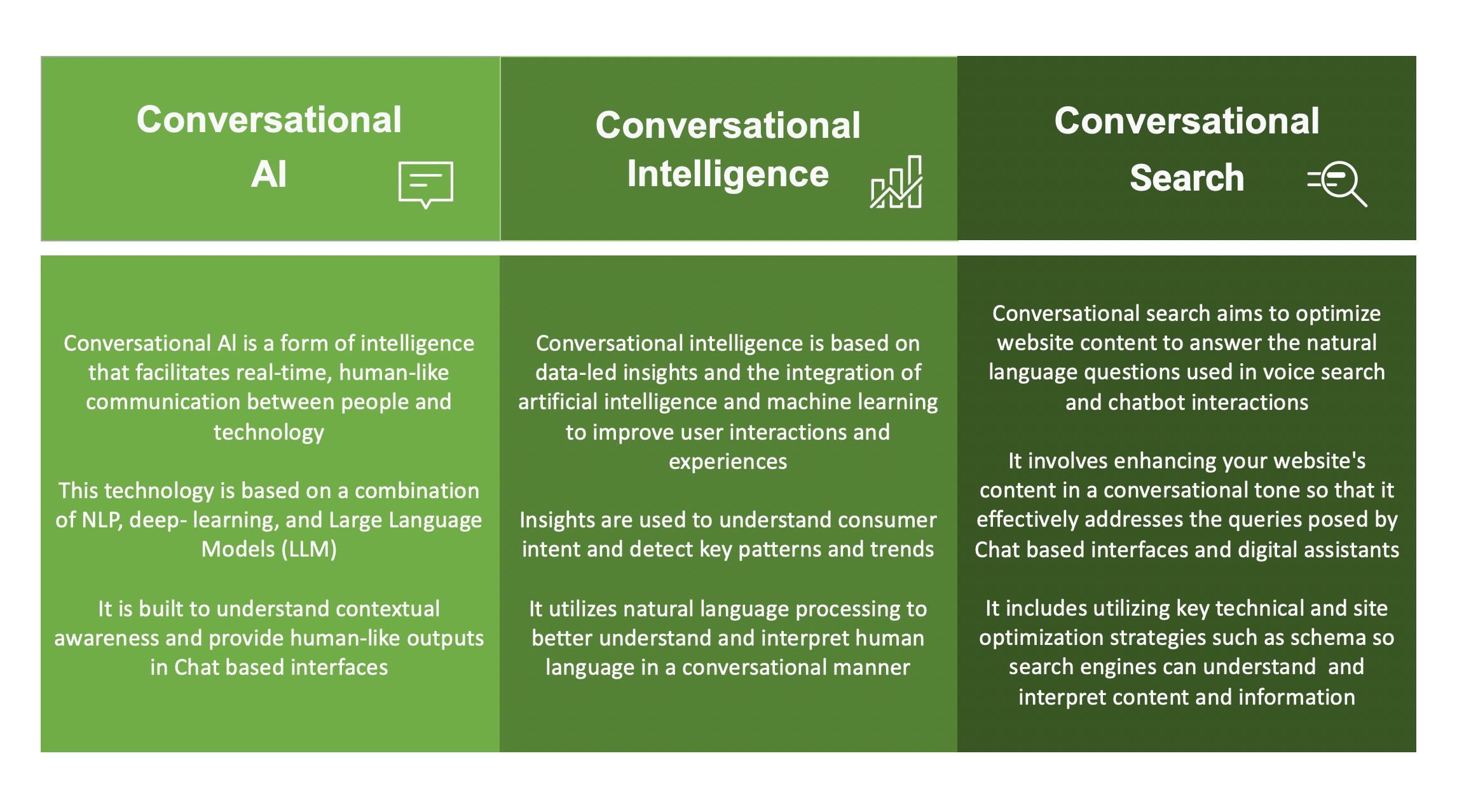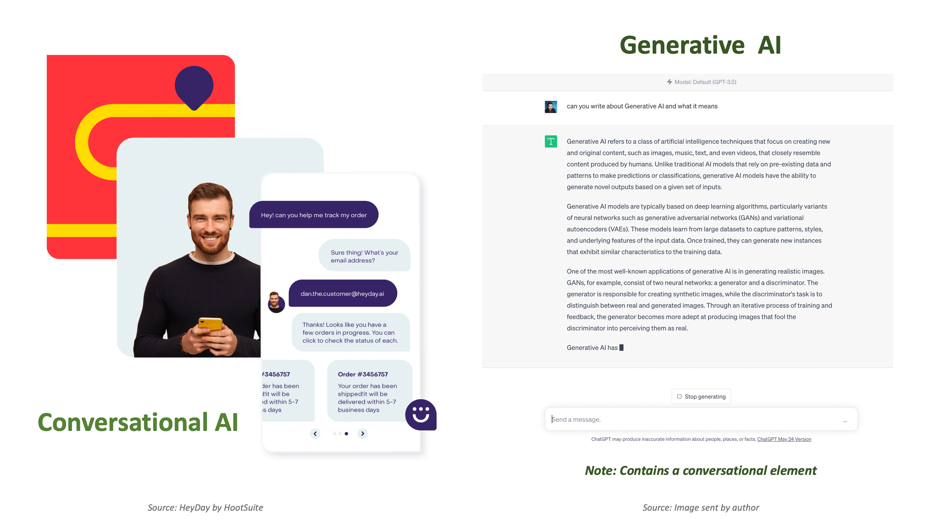You may be surprised to learn that conversational intelligence and AI have actually been around for many years.
From Facebook’s (now Meta) introduction of Messenger in 2016 to the evolution of voice-enabled technologies such as Alexa and Siri, it is ingrained in our everyday life.
The recent growth of chat-based applications and the integration of conversational and generative AI into search engines like Bing and Google has fueled the interest and importance of conversational intelligence.
What Is Conversational Intelligence?
In its simplest marketing form, conversational intelligence is the skill of confidently communicating to achieve successful outcomes. It involves a variety of abilities, such as active listening, empathy, adaptability, clear expression, and building rapport.
This broad range of skills contributes to effective conversations by understanding human communication dynamics.
Where Does It Fit: Conversational AI, Intelligence, And Search?
 Image created by author, June 2023
Image created by author, June 2023Artificial intelligence (AI) has driven a significant shift in the last few years with the emergence of chatbots and voice assistants.
Consequently, search marketing strategies have evolved to reflect this change through conversational intelligence, search, and SEO.
In search marketing, conversational intelligence is based on data-led insights and the integration of artificial intelligence and machine learning aimed to improve user interactions and experiences.
Insights can be used to understand consumer intent and detect critical patterns and trends. Again, AI helps as it utilizes natural language processing to better understand and interpret human language in a conversational manner.
Traditional Nuances Between Conversational And Generative AI
While generative AI increasingly contains conversational elements, conversational AI and generative AI differ slightly in their primary goals:
- Conversational AI is focused on comprehending and reacting to human language, whereas generative AI aims to auto-produce content.
- Conversational AI mimics human conversation by processing natural language inputs and producing similar responses. On the other hand, generative AI creates fresh content by processing data or inputs to generate original outputs.
Generative AI sets itself apart from conversational AI by having the ability to create various forms of content beyond just understanding and responding to human language.
 Image created by author, June 2023
Image created by author, June 2023- Conversational AI demands a vast amount of training data to achieve accurate responses to human language. Meanwhile, generative AI also needs data, but its focus is pattern analysis instead of language comprehension.
- The utilization of conversational AI spans different applications, including customer service, language translation, and personal assistants. However, generative AI is predominantly utilized in research and automated content production. This can include different formats (images, video, code generation, email, social media production, etc.)
Read More On SEJ: New Generative AI Features For Google Ads, Product Studio, And More
Conversational Intelligence And SEO
Conversational SEO aims to optimize website content to answer the natural language questions used in voice search and chatbot interactions.
It involves enhancing your website’s content in a conversational tone to effectively address the queries posed by digital assistants. Conversational SEO targets more natural, human-like queries than traditional keyword-based searches.
Read More On SEJ: Google Launches Bard AI Chatbot To Compete With ChatGPT
In AI, a chatbot or assistant generates helpful content and delivers accurate and efficient assistance by answering users’ questions, providing suggestions, or assisting with tasks beneficially.
This can entail:
- Providing specific information.
- Guiding users through complex processes.
- Navigating complex, intricate software.
Conversational intelligence and content intelligence are vital to enhancing your website and how content is found and optimized.
Analyzing large amounts of data to unearth insightful trends and patterns gives marketers valuable insights into the interests, intent, trends, and popular conversational phrases relevant to your target audience.
By providing real-time data and user behavior insights, you can analyze competitive strategies and optimize your site content.
It also helps you improve audience understanding and adapt marketing campaigns to enhance your website’s visibility, engagement, and conversion rates.
Utilizing its insights also allows you to make data-driven decisions about what to publish on your website.
In addition, the insights you gain give you a competitive edge as you can optimize your content for improved visibility and the evolving search landscape.
Utilizing Conversational Intelligence And The Convergence With Generative AI
The Introduction of Google’s Search Generative Experiences (SGE) is changing how marketers approach content and SEO.
SGE represents the further evolution of the SERP, something that SEOs have long been used to working with and adapting to.
As the potential new SERP contains both generative and conversational elements, it has become vital to understand and optimize for conversational search intent.
Conversational and generative AI are beginning to merge.
 Screenshot by author, May 2023
Screenshot by author, May 2023Read More On SEJ: Google Search Generative Experience: A Look at SGE with 12 AI Overviews
Some key future areas of focus include:
- Understand your customers: To successfully employ conversational SEO, first understand your customers’ language and the types of questions they are likely to ask. From there, you can create content that directly addresses those questions.
- Enhance user experiences: Create an engaging and interactive user experience on your site so chatbots can help find answers to what users ask. This can increase time spent on the site and will conversion rates and increase revenue.
- Personalize your content: Conversational AI provides personalized content suggestions to users based on their previous interactions, search history, and contextual factors. This increases user engagement and relevance, which are essential factors in SEO.
- Optimize for conversational keywords: You can better match your customers’ natural language queries by optimizing content for specific conversational-type phrases.
- Focus on semantics and schema: Conversational intelligence can optimize content for semantic search by understanding the context and intent behind queries. This helps search engines understand the relationships between words and group them together to represent specific concepts. Schema is a necessity and no longer an option to provide context to search engines.
- Test and refine: Continually testing and refining conversational SEO strategies is vital to achieving success. By analyzing chatbot analytics, you can refine content to better answer search prospects and customer questions.
- Prepare for more voice search: Conversational AI has contributed to the growth of voice search. Optimize content with more conversational phrasing to align with how people naturally speak, as conversational AI will incorporate voice search more in the future.
Read More On SEJ: 10 Content Marketing Trends to Watch In 2023.
Conclusion
Conversational intelligence is the foundation for creating chatbots, virtual assistants, and other applications that involve human-machine interactions.
It also has numerous benefits for content and SEO, including improved research on consumer intent, better content creation, enhanced user experience, increased efficiency, and improved SEO and overall digital performance.
Beyond that, it is also vital to improving everyday interactions, facilitating better understanding, and fostering a deeper connection with prospects and customers online.
More resources:
- Google Plans To Integrate Conversational AI Into Search Engine
- Google CEO Confirms AI Features Coming To Search “Soon”
- AI For SEO: Can You Work Faster & Smarter?
Featured Image: Chay_Tee/Shutterstock





